-
-
FeaturesคุณสมบัติPenyelesaianRecursosFiturCaracterísticas精选功能功能特點المزايا
-
Solutionsโซลูชั่นPenyelesaianSoluçõesSolusiSoluciones解决方案解決方案الحلول
-
IntegrationsการผสานรวมIntegrasiIntegraçõesIntegrationsIntegraciones集成整合服務دمج مع تطبيقات أخرى
-
Affiliate/Partnersพันธมิตร/พันธมิตรทรัพยากรAfiliasi/Rakan KongsiAfiliados/ParceirosAfiliasi/MitraAfiliados/Partners联盟/合作伙伴聯盟/合作夥伴شريك
-
ResourcesจองการสาธิตSumberRecursosSumber dayaRecursosالموارد資源中心
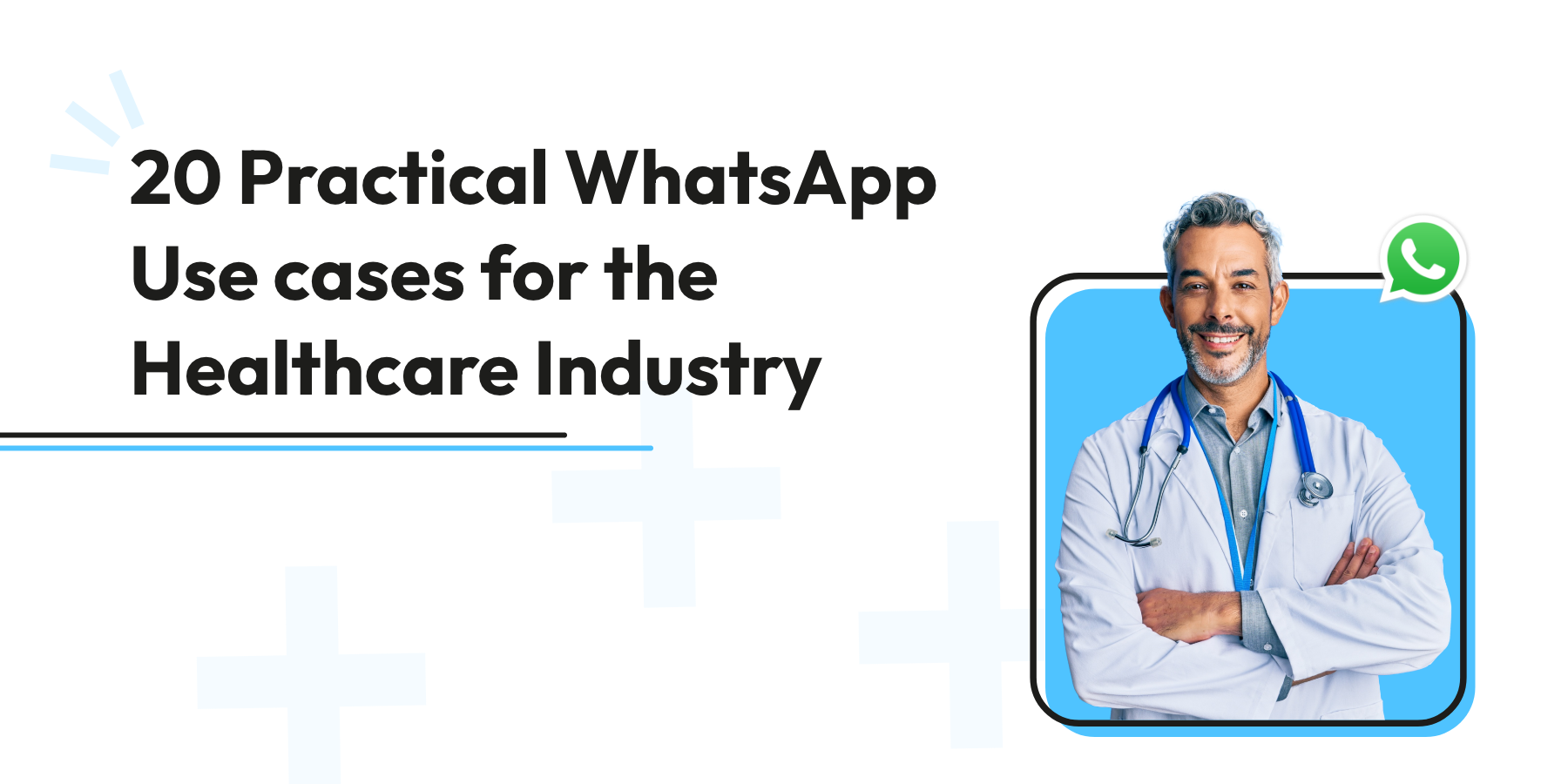
20 Practical WhatsApp Use Cases for The Healthcare Industry
The rapid advancement of technology has permeated all sectors of our lives, and healthcare is no exception. WhatsApp, renowned as a personal communication platform, has emerged as an instrumental tool in the health sector.
Bridging the gap between healthcare providers and beneficiaries is vital in improving accessibility, efficiency, and delivery of health services. 🌐👩⚕️
Collaborative Healthcare: Connecting Health Professionals through WhatsApp
WhatsApp’s group chat feature is a boon for healthcare professionals. It facilitates the formation of professional communities where doctors, nurses, therapists, and other medical staff can:
1. Exchange Professional Insights
WhatsApp can help doctors share their knowledge and learn from each other in a simple way. They can make special groups where they can talk and share their ideas.
In these groups, doctors can talk about challenging cases and ask for advice from other doctors. They can also share research articles or studies that can help everyone learn more.
Using WhatsApp, doctors from different places and specialities can connect and work together easily. They can ask questions, get different opinions, and find solutions together.

This helps them become better doctors and give the best care to their patients. WhatsApp makes it fast and easy to share professional ideas, which can make healthcare better and help patients feel better too.
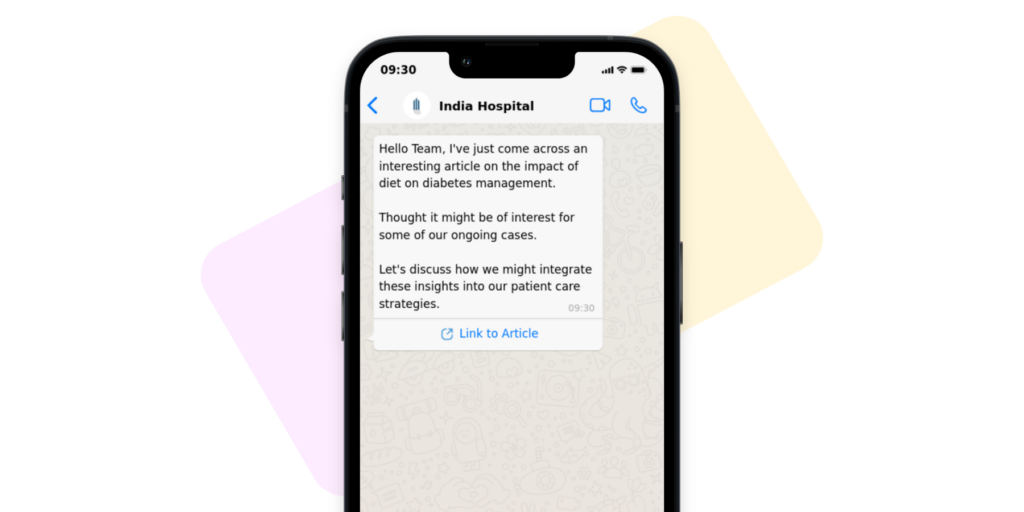
2. Share Medical Research Findings
WhatsApp in healthcare can help doctors share their research findings with each other. They can use WhatsApp to send important information about their research to other doctors and healthcare professionals. They can share papers, studies, and new discoveries they have made.
This helps spread knowledge and improve healthcare. It allows doctors to learn from each other and stay updated on the latest research. Sharing information can lead to better treatments for patients.
WhatsApp also makes it easier for doctors to talk about and understand research together. They can have conversations, ask questions, and share thoughts on the research. This teamwork helps them learn more and come up with new ideas.
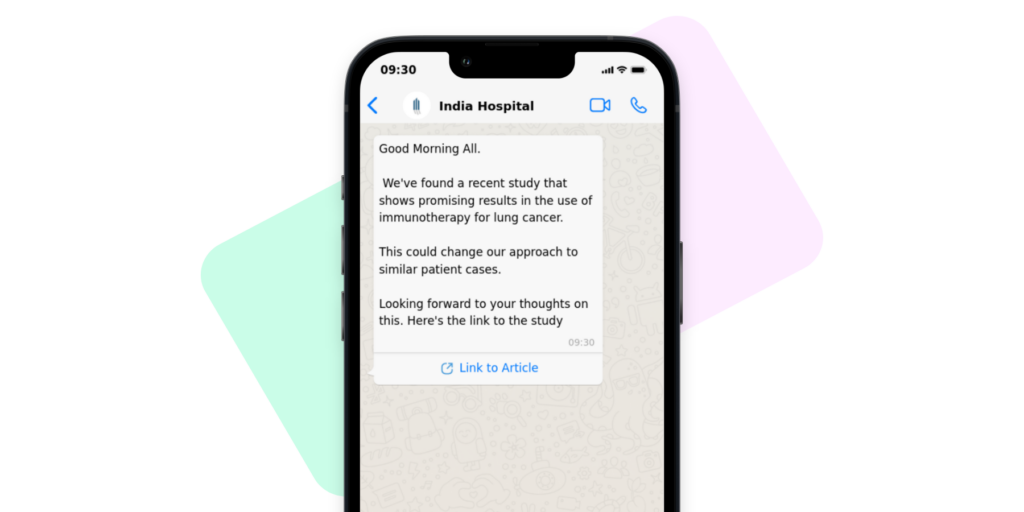
3. Discuss Challenging Cases
Doctors can create special groups on WhatsApp where they can talk about difficult medical situations and ask for advice from their colleagues.
When doctors face a tricky case, they can share the details with other doctors in the WhatsApp group. They can describe the symptoms, tests, and treatments they have tried so far. Other doctors in the group can then provide their insights, suggestions, and experiences to help find the best possible solution.
This collaborative discussion on WhatsApp allows doctors to benefit from the expertise and diverse perspectives of their peers. They can learn from each other, brainstorm ideas, and consider different approaches to the problem. This can lead to better diagnoses and treatment plans for their patients.
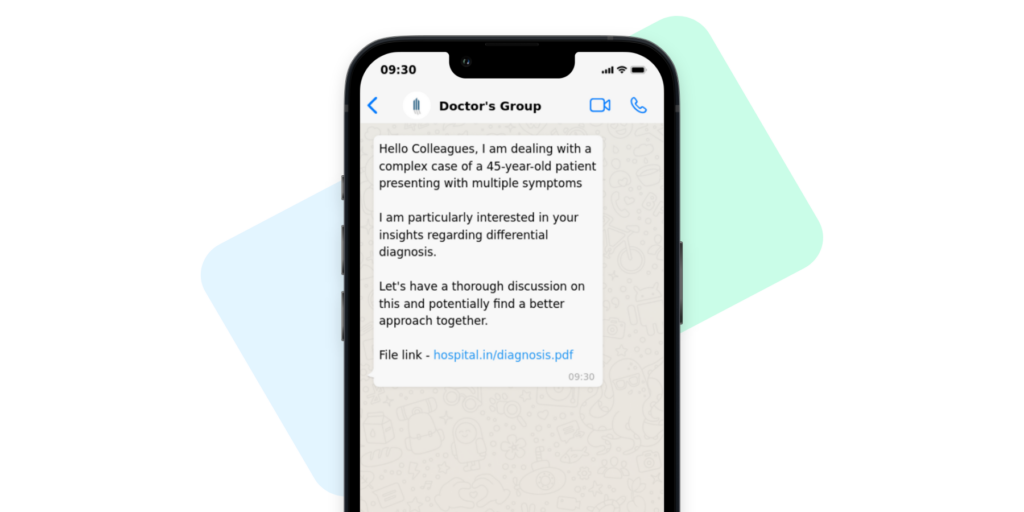
4. Coordinate in Real-Time for Patient Care
WhatsApp can greatly assist doctors in coordinating and collaborating in real-time for patient care. With the help of this app, doctors can communicate with each other quickly and efficiently, ensuring seamless coordination and timely decision-making.
Doctors can create dedicated groups on WhatsApp where they can discuss patient cases, share updates, and exchange vital information. This allows them to coordinate their efforts, align treatment plans, and ensure everyone involved in the patient’s care is on the same page.
In urgent situations, doctors can use WhatsApp to reach out to specialists or consultants for immediate advice or opinions. They can share patient records, diagnostic reports, or even images securely through the app, enabling real-time collaboration even when physically apart.
WhatsApp also enables doctors to assign tasks, set reminders, and share important updates regarding patient care. This ensures that all members of the healthcare team are well-informed and can contribute effectively to the patient’s well-being.
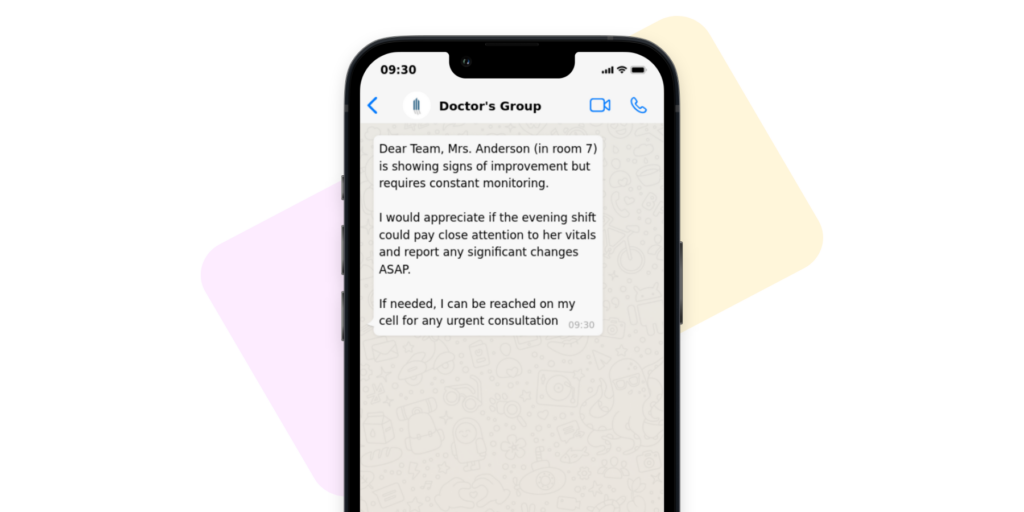
Remember, it’s important to maintain patient confidentiality and security while using platforms such as WhatsApp for healthcare collaboration. Patient information should be anonymized or shared only as necessary, and only with individuals who need that information to provide care.
Revolutionizing Patient Communication: The WhatsApp Impact
Patient care extends beyond the walls of a hospital or clinic. Effective communication plays a crucial role in this continuum of care. WhatsApp aids in:
5. Appointment Scheduling and Reminders
Doctors can use WhatsApp to communicate with patients and schedule appointments conveniently. They can send
Appointment details, including the date, time, and location, directly to the patient’s WhatsApp account. This eliminates the need for phone calls or traditional mail, streamlining the scheduling process.
Additionally, WhatsApp can serve as a helpful platform for sending appointment reminders. Doctors can set up automated or manual reminders to notify patients about upcoming appointments. These reminders can include important instructions, preparation guidelines, or any necessary documentation the patient needs to bring.
Patients can also use WhatsApp to confirm or reschedule their appointments. They can simply send a message to the doctor’s WhatsApp number, indicating their availability or requesting a change. This two-way communication helps in efficiently managing the doctor’s schedule and reduces the likelihood of missed appointments.
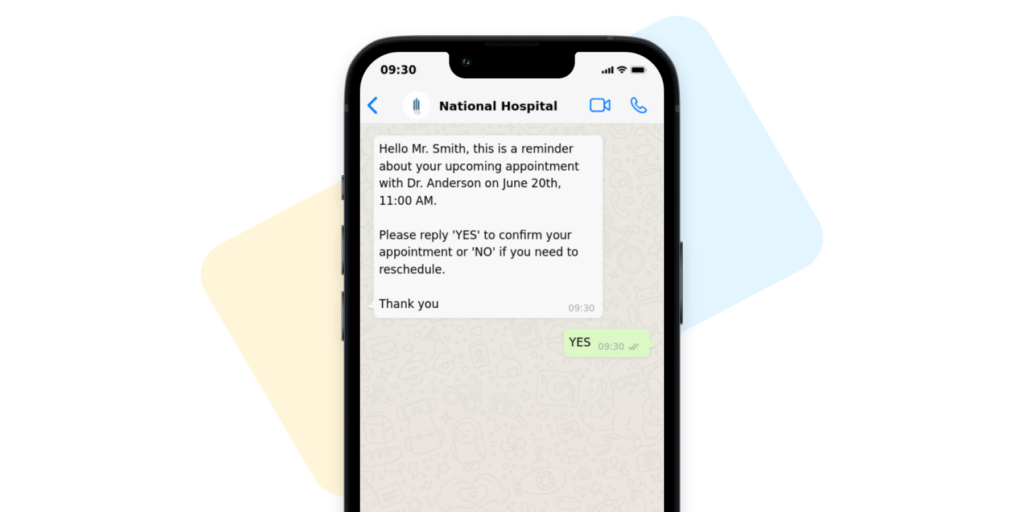
6. Sending Health Updates and Test Results 📈
Doctors can use WhatsApp to share health updates and test results with their patients securely. They can send important information, such as lab reports, diagnostic imaging results, or treatment updates, directly to the patient’s WhatsApp account. This allows patients to receive their health updates in a quick and accessible manner.
By using WhatsApp, doctors can provide explanations and clarifications regarding health updates and test results. Patients can ask questions, seek further information, or discuss any concerns they may have. This facilitates a better understanding of the medical information and promotes patient engagement in their own healthcare journey.
WhatsApp also allows for the exchange of multimedia content. Doctors can send visual aids, charts, or educational materials related to health updates and test results. This visual support can enhance patient comprehension and empower them to make informed decisions about their health.
Furthermore, WhatsApp’s end-to-end encryption ensures the privacy and security of the health updates and test results being shared. This gives patients peace of mind knowing that their sensitive medical information is protected.
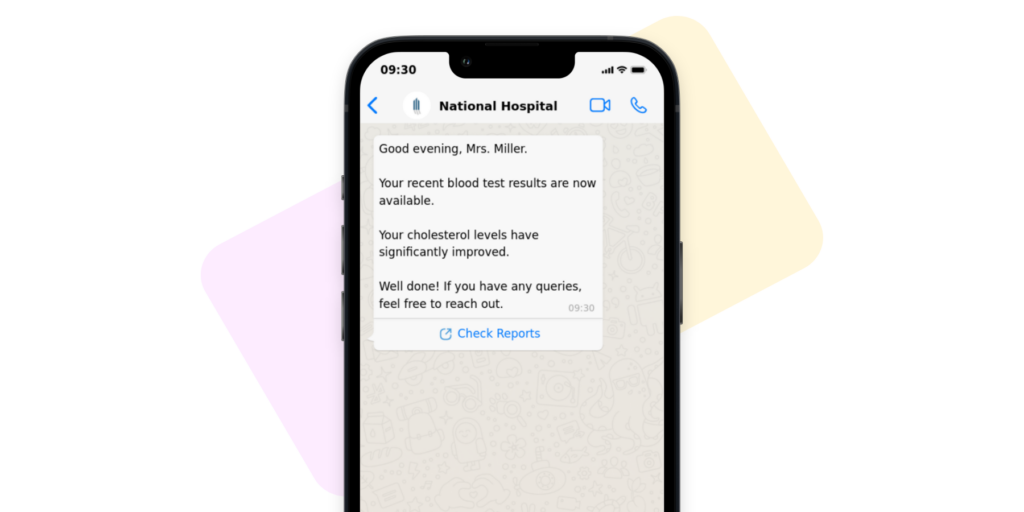
7. Sharing Medication Reminders
Doctors or healthcare providers can set up automated or manual medication reminders through WhatsApp. They can send timely reminders to patients, specifying the medication name, dosage, and frequency. These reminders can be scheduled based on the patient’s prescribed medication regimen, making it easier for patients to remember to take their medications at the right time.
In addition to reminders, WhatsApp can also be used to provide important instructions related to medication. Doctors can share information about how to take the medication, any specific dietary restrictions, or potential side effects to be aware of. This helps patients better understand and adhere to their medication regimen.
Patients can also use WhatsApp to ask questions or seek clarification about their medications. They can communicate with their doctors directly and address any concerns they may have regarding their medications. This two-way communication facilitates better medication management and improves patient adherence.
This enhances patient compliance, encourages proactive health management, and ensures smooth healthcare delivery.
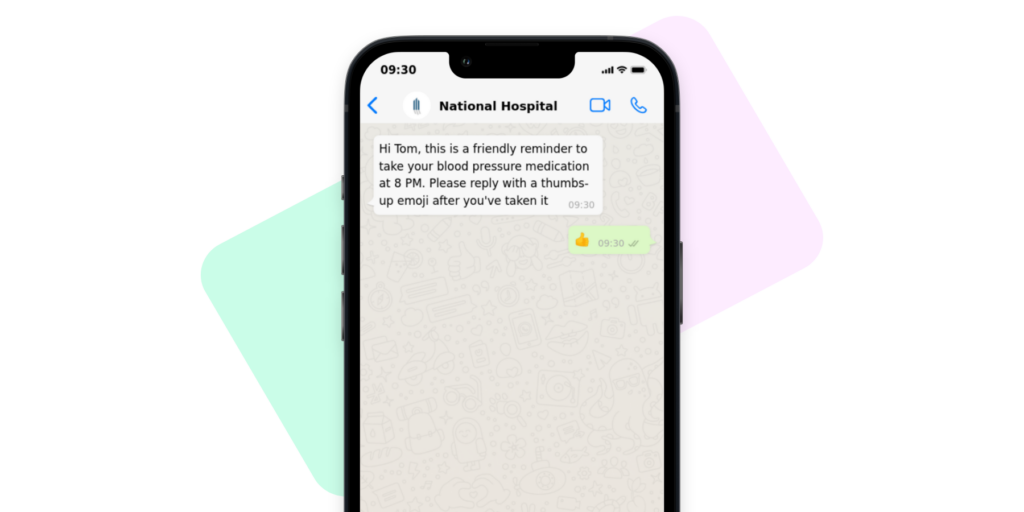
Elevating Health Literacy: WhatsApp as a Health Education Tool
Knowledge is the best prescription for preventing and managing diseases. WhatsApp steps in as a powerful medium for health education. Health organizations and professionals can:
8. Disseminate Health Awareness Messages 💌
WhatsApp allows for the delivery of text messages, images, videos, or even audio recordings, making it versatile in conveying health information. Messages can be tailored to address specific health concerns or targeted at specific demographic groups, ensuring that the information reaches the intended audience effectively.
Moreover, WhatsApp’s interactive nature allows recipients of health awareness messages to engage in discussions, ask questions, or seek clarifications. This fosters a sense of community and encourages individuals to participate in health-related conversations actively
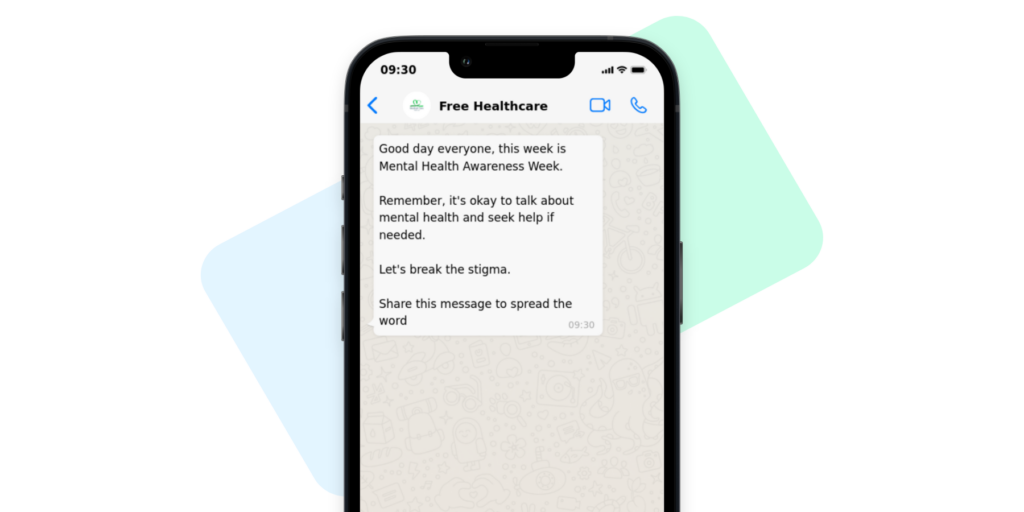
9. Share Preventive Healthcare Tips
WhatsApp in healthcare is a great way to share preventive healthcare tips and empower individuals to take care of their well-being. Healthcare providers can create dedicated groups or broadcast lists to send preventive healthcare tips through WhatsApp regularly. They can share helpful information on topics like healthy eating, exercise, stress management, hygiene practices, and disease prevention. By utilizing multimedia content such as images, videos, and documents, healthcare providers can make the tips more engaging and easier to understand.
The interactive nature of WhatsApp allows individuals to ask questions and seek clarification, promoting a deeper understanding and encouraging active participation in preventive healthcare practices. Additionally, timely reminders can be sent via WhatsApp to remind individuals about important preventive measures like scheduling check-ups, getting vaccinations, or conducting self-screenings.
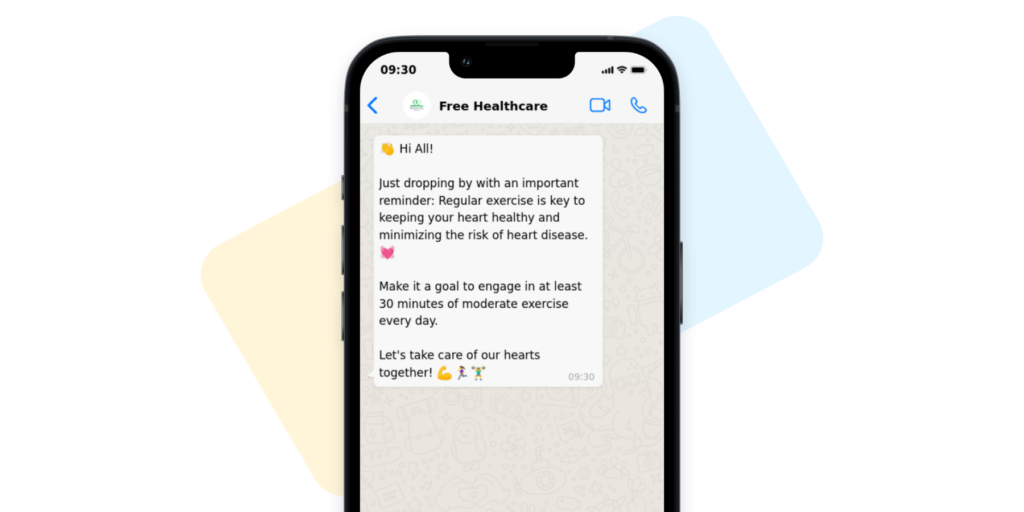
10. Circulate Nutrition Advice
Healthcare providers and nutritionists can create dedicated WhatsApp groups or broadcast lists to share nutrition tips and advice regularly. They can provide information on balanced diets, portion control, and making healthier food choices. Additionally, WhatsApp allows for the sharing of recipe ideas and meal plans, helping individuals adopt nutritious eating habits.
The interactive nature of WhatsApp enables recipients to ask questions, seek clarification, and engage in conversations with healthcare providers and peers. Timely tips and reminders can be sent to encourage individuals to maintain healthy eating practices.
By leveraging WhatsApp, individuals can receive valuable nutrition guidance and make informed decisions about their dietary habits.
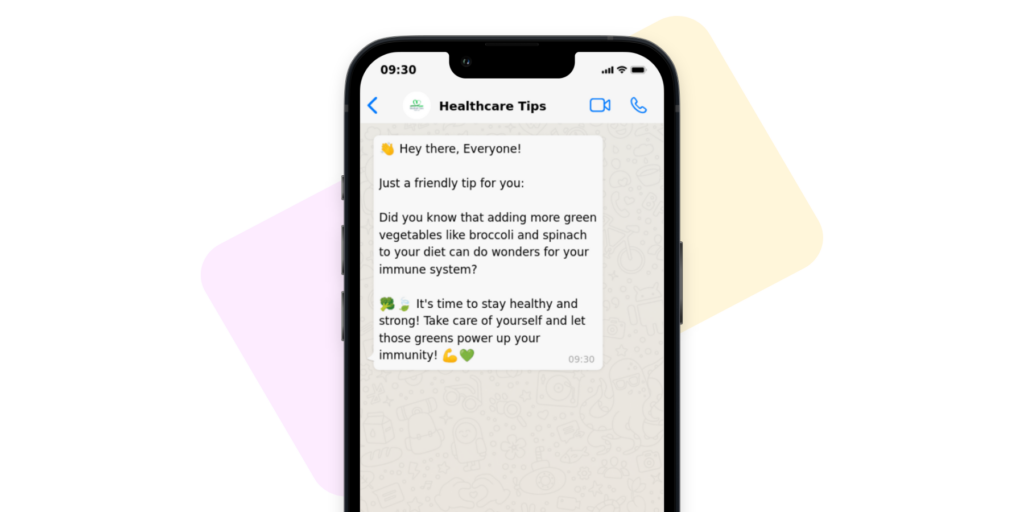
11. Broadcast Public Health Advisories 📢
Healthcare organizations and public health authorities can create broadcast lists to send mass messages, ensuring that important information reaches a large number of recipients simultaneously.
With instant notifications, recipients receive timely updates, increasing the likelihood of prompt action. Additionally, WhatsApp’s support for multimedia content allows for the inclusion of visual aids, making the advisories more engaging and easily understandable.
The two-way communication feature enables individuals to ask questions and seek clarifications, fostering trust and promoting a better understanding of the advisories.
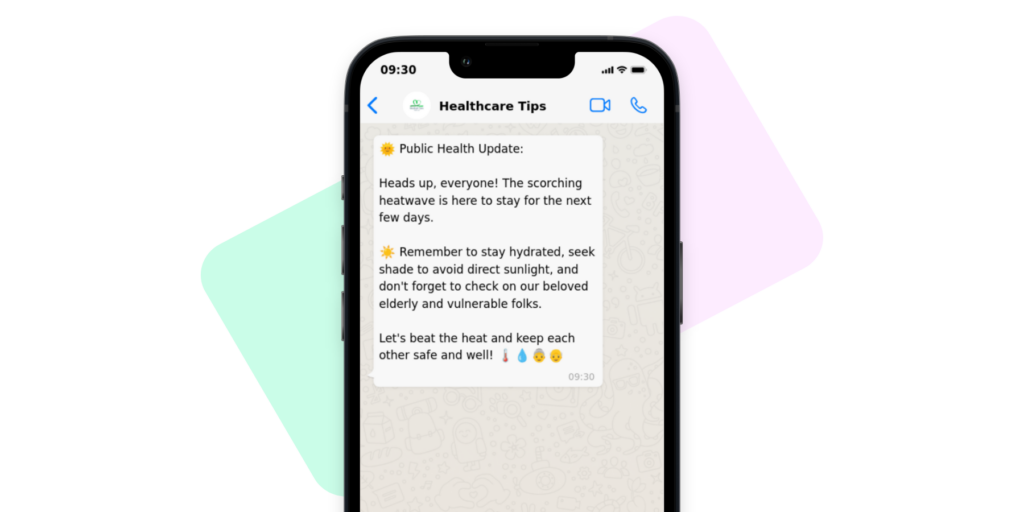
These initiatives empower individuals to make informed health decisions and promote a healthier society.
The Telemedicine Revolution: WhatsApp for Remote Healthcare
For populations with limited access to healthcare facilities, WhatsApp offers a lifeline. Through text, voice messages, images, and video calls, healthcare professionals can:
12. Conduct Remote Consultations
WhatsApp helps doctors and patients connect and talk to each other in healthcare. They can have remote consultations using WhatsApp by sending messages, voice notes, or even doing video calls. Patients can share their symptoms and medical history or ask questions, and doctors can give them advice, diagnosis, and treatment recommendations.
This is helpful when people can’t visit the doctor in person or when it’s not an emergency. Using WhatsApp for remote consultations makes healthcare easier to access and allows people to get medical help from their homes.
WhatsApp also keeps the conversations private and secure with its special encryption. Overall, WhatsApp in healthcare makes remote consultations better and helps patients and doctors communicate more easily.
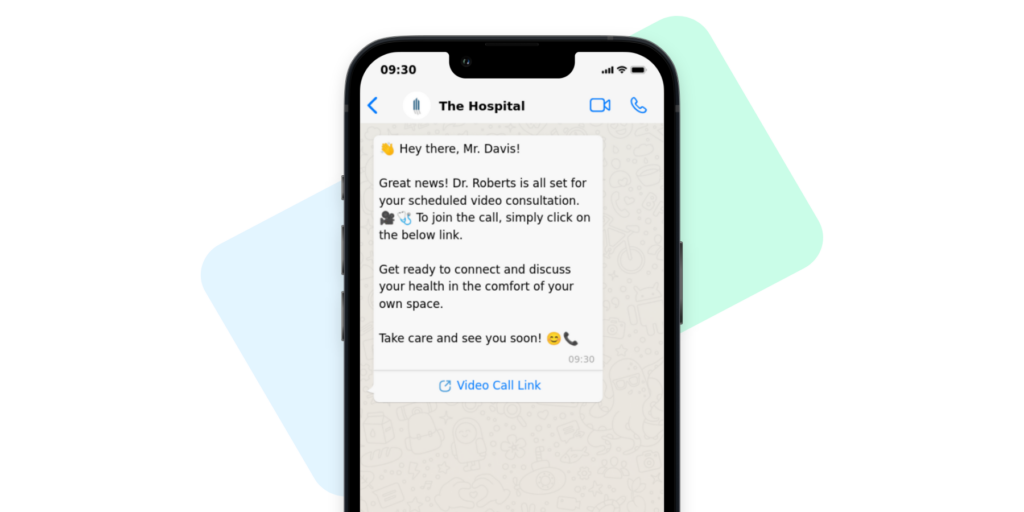
13. Monitor Patients’ Health Status Remotely 👁
WhatsApp in healthcare can help doctors check on how patients are doing without being there in person. Patients can use WhatsApp to send messages or pictures to update their doctors about their health.
They can tell the doctors if their symptoms have changed, ask questions, or get guidance. Doctors can look at the information shared by patients and give advice or make changes to their treatment plans.
This helps doctors stay connected with their patients and ensure they get the help they need, even when they can’t be together physically. It’s a way for doctors to provide support and care to their patients, no matter where they are.
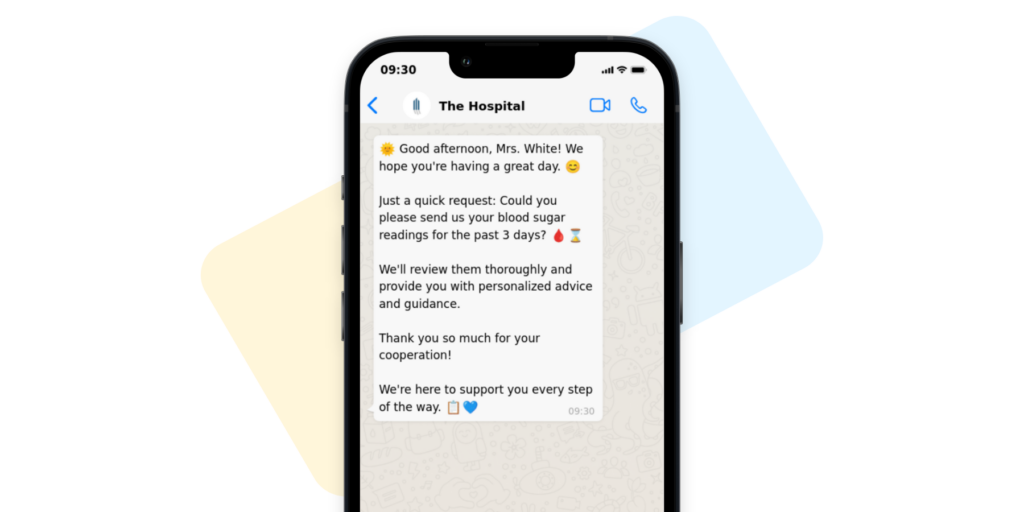
14. Provide Primary Healthcare Advice
Doctors or healthcare providers can use WhatsApp to answer questions about general health concerns, provide guidance on common illnesses like colds or fevers, or offer tips for maintaining a healthy lifestyle.
People can send messages to their doctors, explain their symptoms, and get advice on what to do next.
WhatsApp makes it easy for doctors and patients to communicate and share information, helping people get the primary healthcare advice they need quickly and conveniently.
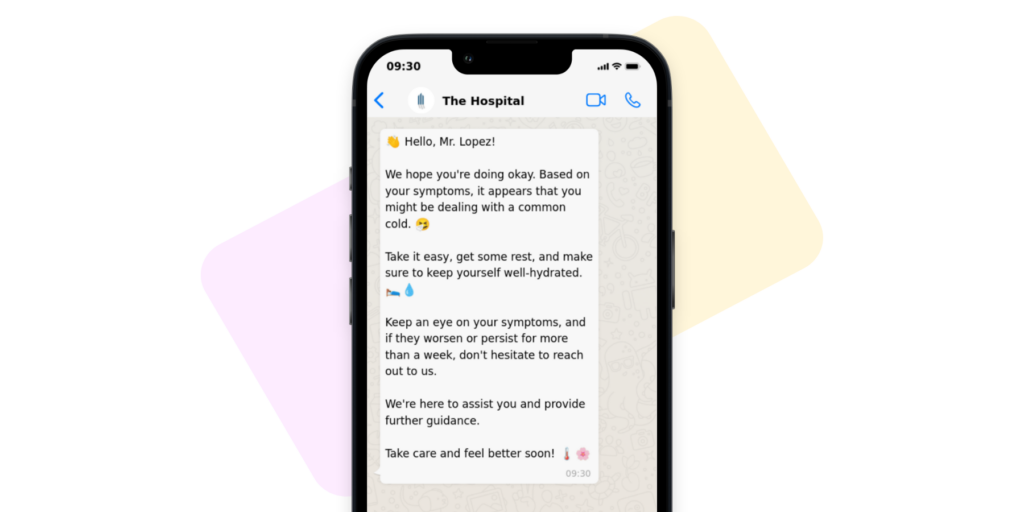
This reduces the healthcare access gap and brings telemedicine benefits to underserved communities.
Swift Emergency Response: WhatsApp in Action
In medical emergencies, every second counts. WhatsApp proves invaluable in:
15. Coordinating Emergency Medical Responses
When there is an emergency, doctors, paramedics, and other people who help in emergencies can use WhatsApp to talk and share important information. They can make special groups or broadcast lists to tell everyone what is happening, give them jobs to do, and update them right away.
This quick communication helps everyone work together and respond fast to the emergency. WhatsApp helps emergency teams talk and make decisions together so that they can help people quickly and better.
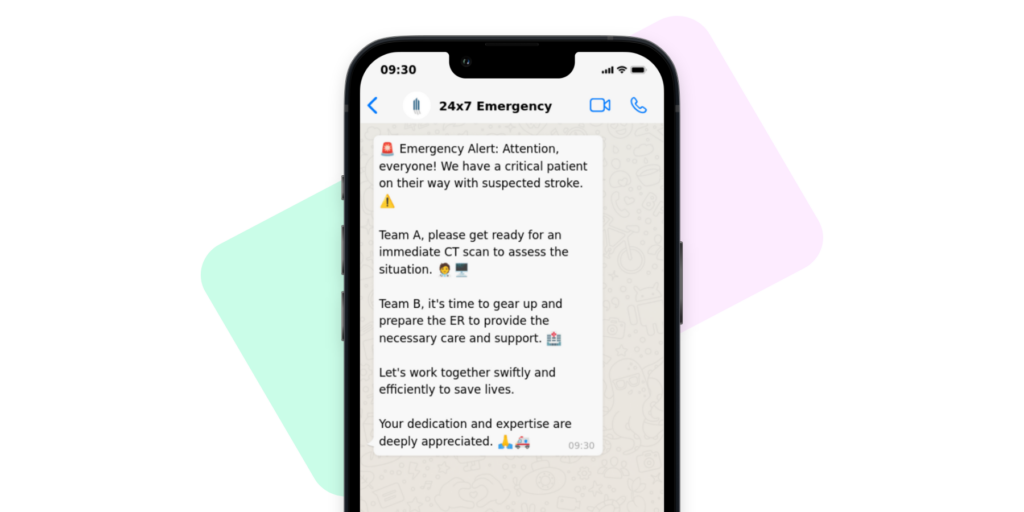
16. Sharing Real-Time Updates
In emergencies, healthcare providers and responders can use WhatsApp to send instant updates about the situation, such as the availability of medical resources, changes in protocols, or evacuation instructions.
They can also share their current location or the location of resources, such as nearby hospitals or medical facilities, to provide accurate and timely information to those in need.
This helps in coordinating responses, ensuring that the right assistance reaches the right place at the right time. By leveraging WhatsApp’s instant messaging and location-sharing features, healthcare teams can enhance their ability to communicate effectively and respond efficiently during critical situations.
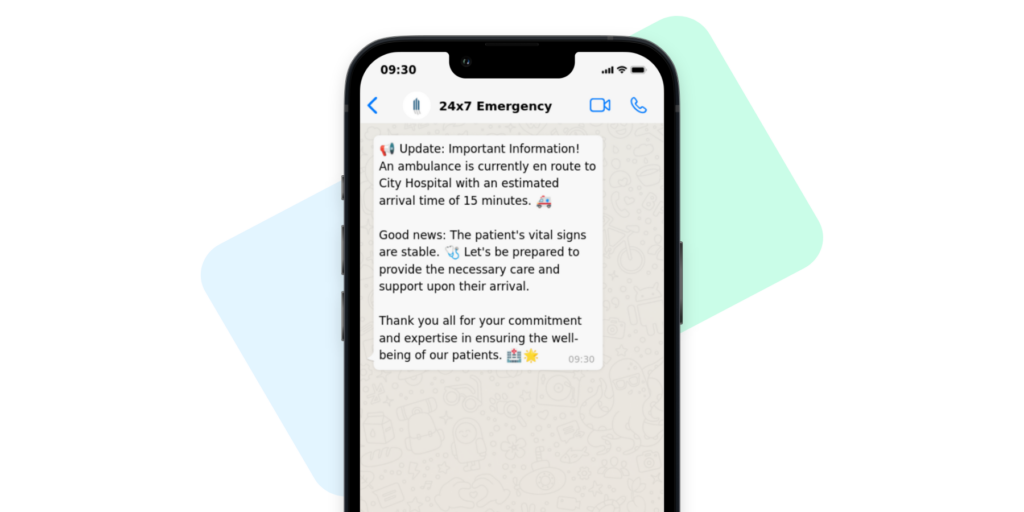
17. Rapidly Mobilising Medical Teams
WhatsApp plays a critical role in quickly mobilizing medical teams during emergencies or urgent situations in healthcare. By using WhatsApp, healthcare leaders can swiftly communicate with medical staff, notifying them about the need for immediate action. Dedicated groups or broadcast lists can be created to send mass messages, informing team members about the situation and providing instructions on where and when to gather.
Through WhatsApp, medical teams can effectively coordinate their efforts, share real-time updates, and strategize for an efficient response. They can exchange vital information, including patient details, medical histories, and necessary equipment, ensuring that everyone is well-informed and prepared. Leveraging WhatsApp’s instant messaging and multimedia-sharing capabilities, healthcare teams can rapidly mobilize, collaborate, and respond to emergencies with speed and efficiency, ultimately enhancing patient care and outcomes.
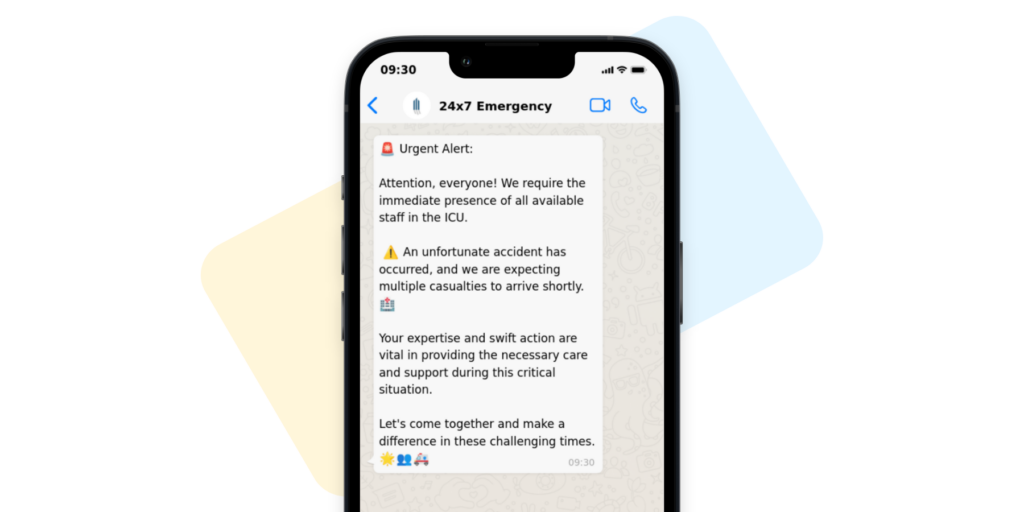
The swift communication facilitated by WhatsApp can often make the difference between life and death.
Protecting Health Information: Privacy and Data Security on WhatsApp
Health information is sensitive, and its protection is paramount. WhatsApp, with its end-to-end encryption, ensures:
18. Secure Patient Communication
End-to-end encryption ensures that messages exchanged between patients and healthcare providers are encrypted and can only be accessed by the intended recipients. This encryption helps protect sensitive patient information and ensures that it remains confidential and secure during transmission.
Additionally, healthcare organizations can implement strict privacy and security protocols when using WhatsApp in healthcare settings. This may include measures such as password protection, secure login procedures, and limited access to patient data. By adhering to these protocols, healthcare providers can safeguard patient communication and maintain the privacy of sensitive information.
It’s important for healthcare providers also to ensure that they comply with relevant data protection regulations and guidelines when using WhatsApp in healthcare.
By doing so, they can uphold patient privacy rights and maintain the highest standards of confidentiality and security in their communication practices.
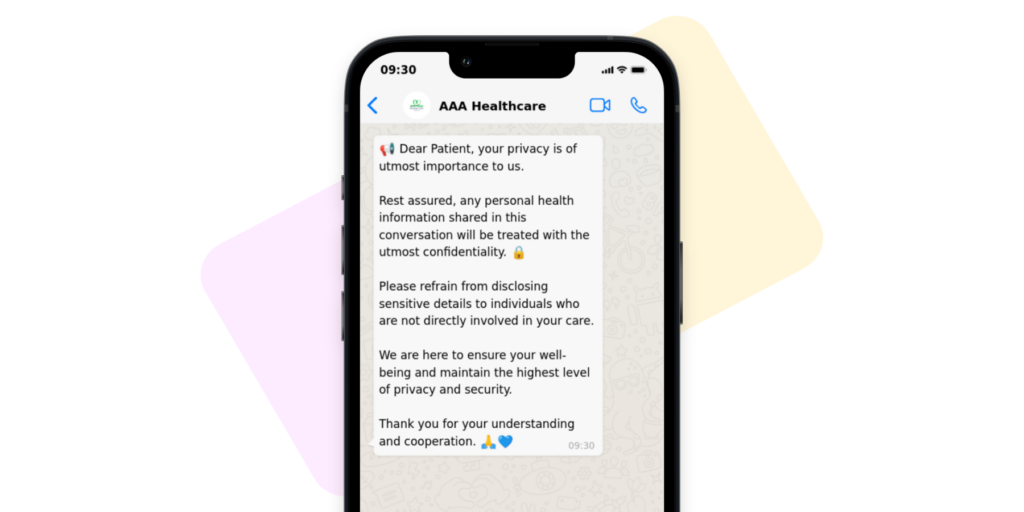
19. Confidentiality of Health Data
WhatsApp in healthcare helps keep health data confidential by using special security measures. It has something called end-to-end encryption, which keeps messages private and only lets the intended people see them.
Healthcare organizations also have rules and regulations they follow to protect patient information. They teach their employees how to use WhatsApp safely and keep patient data secure.
By doing these things, healthcare providers can use WhatsApp while making sure that health data stays private and confidential.
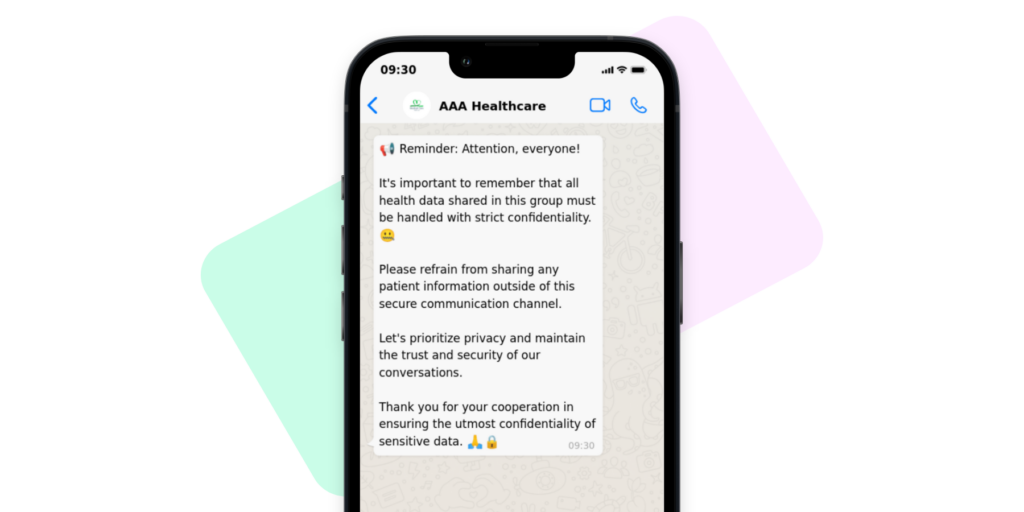
20. Compliance With Privacy Laws 👩⚖️
WhatsApp in healthcare is a tool that helps doctors and nurses follow the rules about keeping information private. It has special things called encryption that ensure messages are safe and only seen by the right people.
Healthcare organizations use WhatsApp in a way that follows laws like HIPAA, which is about keeping patient information private. They make sure they handle and store patient information correctly so it stays secret. By using WhatsApp carefully, doctors and nurses can follow the rules and keep patient information safe.
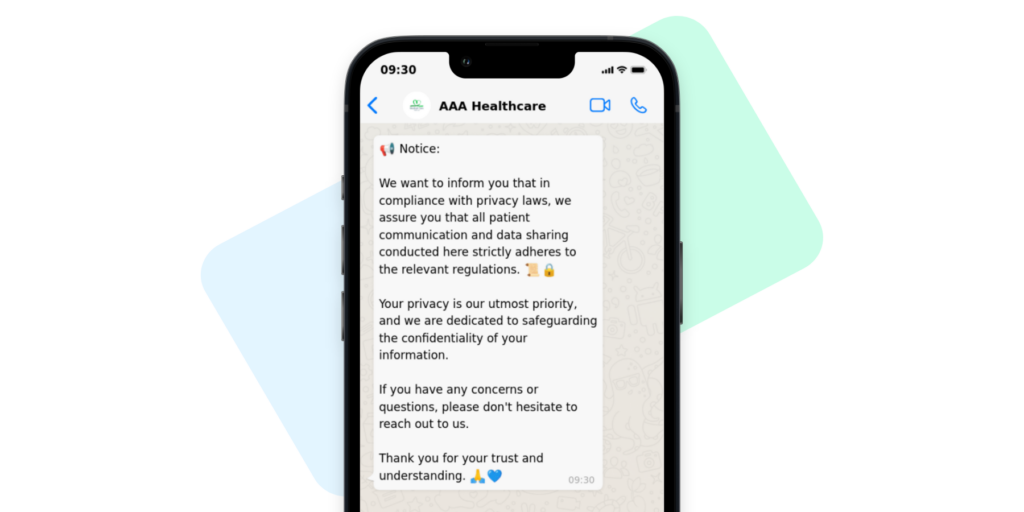
Success Stories: WhatsApp’s Global Impact on Health
Healthcare institutions worldwide are leveraging WhatsApp to enhance their services. In India, the government-run National Health Portal uses WhatsApp to disseminate health alerts and advisories. In Brazil, clinics use WhatsApp to send appointment reminders and health tips to patients.
These cases underline the transformative potential of WhatsApp in healthcare.
Looking Ahead: Envisioning the Future of Health with WhatsApp
The potential of WhatsApp for health is immense. From personalized healthcare to community health initiatives, it opens up a spectrum of possibilities. By responsibly navigating its challenges and maximizing its potential, we can look forward to a future where healthcare is more accessible, efficient, and patient-centric.
Harnessing WhatsApp for Health and Wellness
By bridging the gap between healthcare providers and beneficiaries, WhatsApp is revolutionizing the healthcare landscape. Its broad reach, user-friendly interface, and diverse features make it a compelling platform for health communication.
Stepping up this revolution is Wati, a trusted WhatsApp Business API provider. It assists healthcare institutions in managing their WhatsApp communications effectively while ensuring data security and privacy.
Wati makes it possible to automate responses, streamline bulk messaging, and manage contacts, thereby allowing health professionals to focus on their prime objective – patient care.
With the combined power of WhatsApp and Wati, healthcare is no longer bound by physical barriers. It’s accessible, right at our fingertips, marking a new era in health and wellness.
Questions and Answers about WhatsApp in Healthcare
Do doctors use WhatsApp?
Yes, doctors often use WhatsApp for its immediacy and convenience in communicating with colleagues and patients. Wati can support doctors in utilizing WhatsApp for Healthcare by providing a platform that enables secure messaging, helps manage patient communications efficiently, and integrates with existing healthcare systems to maintain data privacy and security.
Do hospitals use WhatsApp?
Many hospitals have adopted WhatsApp as a tool for quick communication among staff and with patients. Wati can assist hospitals in leveraging WhatsApp for Healthcare by ensuring secure exchanges of information, streamlining appointment scheduling, and facilitating patient engagement while adhering to compliance standards.
What is the WhatsApp chatbot for health?
A WhatsApp chatbot for health is an automated messaging tool that can interact with patients on WhatsApp to provide healthcare services such as symptom checking, appointment booking, and providing health information. Wati offers such chatbot solutions, tailored for healthcare providers, to enhance patient communication and support healthcare delivery through the familiar interface of WhatsApp.
Is WhatsApp safe to use in healthcare?
When used with proper precautions and within a secure platform like Wati, WhatsApp can be a safe communication tool in healthcare. Wati helps ensure that WhatsApp usage complies with safety standards by providing end-to-end encryption and secure data handling practices to protect sensitive health information.
Why do doctors use WhatsApp?
Doctors use WhatsApp because it is user-friendly and facilitates instant communication, which can be crucial in the medical field. Wati can enhance the use of WhatsApp for doctors by providing tools for secure messaging, automation of routine communications, and maintaining patient data confidentiality.
Is WhatsApp HIPAA compliant?
On its own, WhatsApp is not HIPAA compliant. However, when integrated with a secure platform such as Wati, which offers features like encryption and secure data storage, it can be part of a HIPAA-compliant solution. Wati helps healthcare providers ensure that their use of WhatsApp adheres to HIPAA regulations by implementing necessary safeguards for protecting patient health information.
Latest Comments